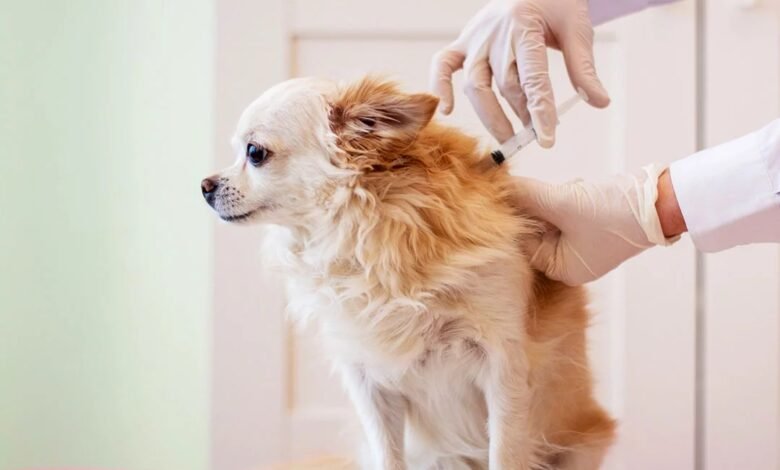
Complete Guide for the First-Year Puppy Vaccinations
We know that repeating appointments to get your puppy vaccinated and have its boosters administered may seem pretty inconvenient, but following your dog’s vaccination schedule is incredibly important. This goes doubly for young puppies who are getting their first vaccinations.
Why Should You Get Your Dog Vaccinated?
Just like the case of vaccines designed for use by people, vaccines for dogs in the Madison area help to protect your pet from a huge variety of serious, and even fatal, diseases that can spread like wildfire among unvaccinated dogs.
While it may seem inconvenient (and even a bit expensive) to bring your new puppy into your vet’s office frequently throughout their first year, your puppy’s first vaccinations and their renewals each year are critical to protecting them from illness and setting them up for long, healthy and happy lives.
What Illnesses Are Addressed by My Dog’s Shots?
The vaccines recommended for puppies and adult dogs in the Madison area help prevent and reduce the severity of illnesses like parvovirus, hepatitis, distemper, bordetella, and rabies.
Our vets will be able to recommend a set of vaccinations that are the most appropriate for your dog based on their age, the area you live, your dog’s lifestyle, and other factors.
Dog Vaccine Schedule
The following is the schedule of vaccinations recommended for your puppy during their first few months and the booster shots required for an adult dog throughout their life. By following these schedules of puppy shots and adult dog vaccine boosters, our vets firmly believe that you will be giving your beloved canine companion their best shot at good health and well-being throughout their life.
Puppy Shot Schedule
6 – 8 Weeks
- Influenza Virus-H3N8
- Influenza Virus-H3N2
- *DHPP Shot 1
- Bordatella
- Leptospira
- Lyme
10 – 12 Weeks
- Influenza Virus-H3N8
- Influenza Virus-H3N2
- *DHPP Shot 2
- Leptospira
- Lyme
- Rabies
14 – 16 Weeks
- *DHPP Shot 3
Adult Dog Vaccine Schedule
Annually
- Influenza Virus-H3N8
- Influenza Virus-H3N2
- Bordatella
- Leptospira
- Lyme
- Rabies
Every 3 Years
- *DHPP Booster
- Rabies
*DHPP: This vaccine protects your dog against a combination of illnesses: Distemper, Adenovirus, Parvovirus, and Parainfluenza.
Age Restrictions
Ask your vet to find out more about what vaccines are appropriate for your dog when they are still a puppy. Depending on your pet’s age, their immune system may not be strong enough to effectively be boosted by all shots.
Possible Vaccine Side Effects in Puppies
Side effects of vaccines are quite common, including cold-like symptoms, mild fevers, or lethargy. These are all signs that your puppy or adult dog is having an appropriate reaction to the vaccine.
However, some dogs may have serious allergic reactions to getting their shots. This is generally because of sensitivity to a specific ingredient in a vaccine. These reactions are not standard to breed or vaccine and may depend on your dog—although certain breeds can be predisposed to allergies to certain vaccines.
Some breeds like collies, sheepdogs, and German Shepherds are known to be predisposed to more significant reactions to some vaccines. Your vet will be sure to skip any vaccines that your dog may be sensitive to or allergic to.
If your dog does react to a vaccination, take them to your vet as soon as possible and make note of the kind of vaccination they received. This will be important information to keep on hand if you move or switch vets in the future.
The Importance of Dog Vaccinations
Vaccinations are the cornerstone of your puppy’s preventative health care.
By bringing your dog in for their shots early in their life, you are helping to protect them against some serious diseases that may prey on them while their immune systems are still developing. And then, by continuing this practice into their adult life, you help ensure that they avoid serious health issues throughout their life.
Maintaining the schedule of vaccinations recommended by our Madison vets will not only protect your dog’s health but will help to save you time and money in the long run by avoiding more serious veterinary visits (or even emergencies) in the future.
Preventive treatments for diseases are nearly always less expensive and time-consuming than treatments for them in their advanced stages.
Note: The advice provided in this post is intended for informational purposes and does not constitute medical advice regarding pets. For an accurate diagnosis of your pet’s condition, please make an appointment with your vet.








5 Comments